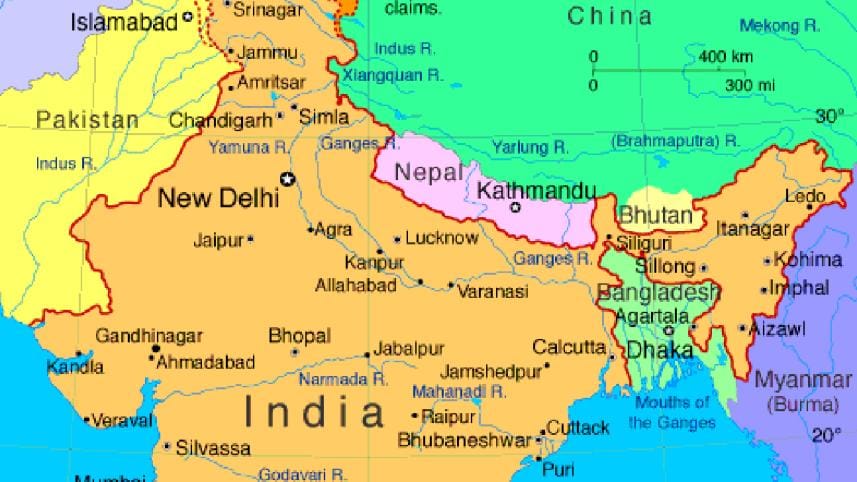Bhutan asks Bangladesh to limit buses, trucks to border

In what may comfort local truckers worried about the implications of the Bangladesh, Bhutan, India, and Nepal Motor Vehicle Agreement (BBIN MVA), the Bhutan government has requested Bangladesh to limit their cargo and bus services to the Bhutanese border.
The same request will be made to the Nepalese government on the same grounds that Bhutan is a small country in a unique situation, Bhutan's information and communications minister said.
However, the government of Bangladesh is yet to respond to this request.
If the special requests are accepted by the governments of Bangladesh and Nepal, this will mean that Bhutanese trucks and bus services will also have to stop at the Bangladesh and Nepal borders, which is the current situation.
Bhutanese trucks transporting perishables to Bangladesh would have to continue to stop at Burimari, the Bangladeshi border town, instead of being able to go all the way to Dhaka or beyond.
Bhutan's existing informal arrangement with India will continue even if the BBIN MVA is ratified. This is made clear under Article 14 section five of the BBIN MVA which states that existing bilateral agreements or arrangements will not be affected by the agreement.
Currently, trucks from India are allowed only until the border where the goods are then transferred onto Bhutanese trucks.
There are exceptions. Heavy-duty trucks from India carrying large equipment, which local trucks do not have the capacity to carry are permitted into Bhutan.
Ratification of the BBIN MVA would not alter this arrangement, ministry officials said.
Meanwhile, two Bhutanese bus companies operate to Kolkata. No Indian bus companies operate into Bhutan. While Bhutanese and Indian private vehicles can cross the border with little restriction, taxis are not allowed to.
If Bangladesh and Nepal do not agree with the government's request for a similar arrangement when it comes to cargo trucks and bus services, and if the BBIN MVA is not ratified by parliament, lyonpo DN Dhungyel said that the economic implications for Bhutan may not be significant. "The BBIN MVA was mainly intended to promote trade in the sub-region," lyonpo said. "It may not have significant economic consequences since the existing informal arrangement with India will continue."
However, he pointed out that trade with Bangladesh for Bhutanese truckers could have been easier as they would not have required to transship consignments at Burimari. "Avoiding the need to transship at Burimari would have reduced transportation cost, delay, damage to perishable goods and other inconveniences," lyonpo said.
But if Bhutanese trucks are allowed into Bangladesh, an equal number of Bangladeshi trucks would have to be allowed into Bhutan as the BBIN MVA is based on reciprocity. This has led to concerns that Bhutan could be overwhelmed by large numbers of regional trucks and vehicles.
Lyonpo DN Dhungyel pointed out that the number of cargo vehicles and scheduled bus services would be pre-determined between countries, for instance, between Bhutan and Bangladesh or Bhutan and Nepal or vice versa. And this pre-determined number would be based on how many Bhutanese vehicles would want to operate to either country. "While the frequency of scheduled bus services might be agreed at 1-2 frequency every week, the number of cargo vehicles might be the same that Bhutanese business people want to operate into Bangladesh or Nepal," he said.
Lyonpo Dhungyel also downplayed concerns that large numbers of Bangladeshi and Nepalese trucks would be entering Bhutan with goods. "Because of limited trade with Bangladesh and Nepal, it is very unlikely that a large number of cargo vehicles would be operating into Bhutan," lyonpo said. "Bangladeshi and Nepali operators may not find it economically attractive to operate into Bhutan with load only one way."
According to trade statistics, Bhutan exports more than it imports from both Bangladesh and Nepal.
Bhutan imported Nu 169.6 million worth of goods from Bangladesh in 2014, ranking it as the 17th most country Bhutan exported to. However, Bhutan exported goods worth Nu 1.7 billion to Bangladesh last year making it the second ranked country Bhutan exported to. Statistics also show that Bhutan's imports from Nepal equalled almost Nu 120 million while exports was Nu 178.4 million, last year.
Coming to private vehicles, the minister said only a small number would be permitted from Bangladesh and Nepal but he did not provide specific numbers. "With regard to non-regular and personal vehicles, the number is not expected to be large and a capping would be agreed while finalizing the protocol to keep the number small," he said.
Non-regular vehicles mean for instance a group of pilgrims who hire a bus or a private vehicle to travel to Bodhgaya or Lumbini.
Ministry officials said that the BBIN MVA does not permit for the inter-country operation of taxis.
Some of the other restrictions of the BBIN MVA include disallowing foreign trucks and buses from doing local business in the country being visited, charging the unsubsidised rates for fuel when refuelling, time limits for being in a country, and non-exemption from required immigration visas and permits, and customs inspections, among others.
Under the BBIN MVA, additional charges or taxes can be levied on visiting vehicles but only if these charges are also levied on local vehicles.
While the ambassadors of India and Bangladesh to Bhutan had called for the BBIN MVA to be ratified as soon as possible, it will be discussed only in the next session of parliament, given the concerns of the Opposition Party.
Asked for comment, the Opposition Leader, (Dr) Pema Gyamtsho, said: "The Opposition Party had expressed concerns on the implications of the agreement on our security, economy, environment and culture and there is a need for critical analysis by various stakeholders and deeper consultations with all concerned groups."
The Asian News Network/ Kuensel



 For all latest news, follow The Daily Star's Google News channel.
For all latest news, follow The Daily Star's Google News channel.
Comments